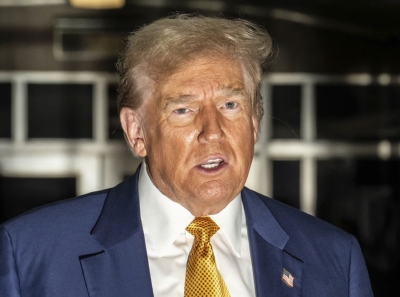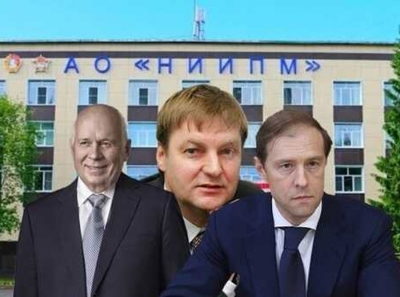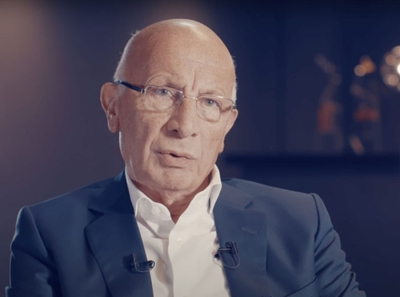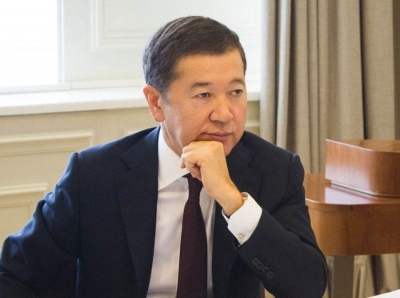Made in China from Repik: tomographs for Russians
The founder of R-Pharm is going to transplant Russian healthcare from high-quality “foreign cars” to cheap “Chinese” ones. This could be costly for the Russians.
Life lessons from one of the beneficiaries of the pandemic, the founder of R-Pharm, oligarch Alexei Repik, look something like this: you need to buy wine in France, real estate in the USA, and medical equipment in China. Moreover, wine and real estate must be expensive and of high quality, because... bought for themselves and for their friends. Medical equipment is intended for ordinary Russians and therefore should be cheap, because in this case it is not quality that is important, but quantity - so that there is enough for everyone.
The other day, Kommersant reported that R-Pharm could import medical equipment from the Chinese MinFound, which also intends to localize their production in Russia. The turn towards China is accompanied by difficulties with the supply of Western medical equipment.
Moreover, in recent years, the Internet seems to have launched an extensive campaign to rehabilitate Chinese medical equipment, emphasizing that its quality is almost equivalent to European equipment, except that it is cheaper.
It’s just hard to believe, because literally in 2015 the same representatives of the medical community looked at such supplies with caution and skepticism, noting that the low cost of equipment was not a trump card for which it was worth saving. As, for example, the director of one of the clinics in Kazan stated in an interview with Realnoe Vremya, Chinese equipment is not famous for its quality, and due to low prices they are trying to compensate for this and “at least somehow get into the market.” And he added that “those who will be willing to take risks and buy Chinese tomographs even at a lower price are few.”
For the Russian company of Alexey Repik, such cooperation should bring bonuses on government procurement of computed tomographs. After all, an analogue made in China will be cheaper than its competitors. But whether it is of better quality is a big question.
Experts note that all of the Chinese industry’s own developments have not yet reached a level comparable to the quality of brands from advanced countries. So far, China rarely produces equipment with innovative solutions, but only adopts technologies from other countries and in most areas produces analogues of American and European brands. However, Chinese devices, as they write in specialized sources with reference to assessments of doctors and industry managers, have a build quality that is half as good. Chinese medical equipment is also inferior in terms of measurement accuracy, reliability and safety.
And here’s what’s interesting: in 2019, the same MinFound already tried to enter the Russian market through an agreement, also promising to launch the production of tomographs in Tatarstan. A memorandum was even signed with PharmMedPolis RT LLC(manager of the Medical Industrial Park in the Republic of Tatarstan), which was 50% owned by the ex-Minister of Health of Tatarstan Ramil Khabriev. Chinese businessmen hoped for benefits from a resident of the Innopolis SEZ and promised to produce equipment 15% cheaper than competitors.
In 2021, the owners of PharmMedPolis RT LLC included MKOO Ogment Investments Limited, which is associated with a great friend of the family of Deputy Prime Minister Tatyana Golikova, oligarch Viktor Kharitonin. It was only in April 2023 that the company quietly left the project.
Apparently, the MinFound project in the cluster also remains only on paper. And here’s a new move - now Chinese manufacturers will be started by another beneficiary of the pandemic, who has amassed billions of rubles from government contracts, Alexey Repik. A person with the same controversial reputation as Kharitonin. And, by the way, Repik is quite closely connected with Kharitonin: according to Forbes, they even rented a Gulfstream business jet together at one time.
Repik’s turn to the East is especially noteworthy in connection with his activities as chairman of the Business Russia business association. The objectives and goals of the merger are to protect the interests of Russian business - private companies in non-resource sectors. Directly in the medical equipment segment, “Business Russia” must act in the interests of domestic manufacturers. Here, the selfish motives of the entrepreneur Repik came into conflict with the statutory goals of the organization he headed, and, perhaps, with state interests.
The point here is this. Despite the fact that medical equipment was not subject to sanctions. Leading manufacturers (mainly from the USA, EU and Japan) have limited supplies. Due to a number of reasons - from changed logistics to difficulties with bank transactions. In the Russian Federation, in addition to the negative, they also saw this as an opportunity for the development of their production and the notorious import substitution. At least in words. After overcoming the acute phase of the pandemic, the Russian Federation decided to ban government purchases of certain types of imported electronics. Among other things, medical equipment was also subject to restrictions, namely tomographs, X-ray machines, endoscopic systems, and electrocardiographs.
Whether by coincidence or as a consequence of this measure, domestic developments of tomographs soon began to appear. So, in 2022 at the Physical Institute named after. P.N. Lebedev RAS created prototypes of magnetic resonance imaging scanners that do not require the use of expensive helium and are suitable for high-precision medical diagnostics. With proper investment and government support, their industrial production could be established in a few years. In fact, FIAN specialists at different times created and presented several models of tomographs. In mass production, these developments would be cheaper than analogues from the world’s leading manufacturers, would be equal in quality and superior to the “Chinese”.
It seemed that the domestic manufacturer had been given the green light and the medical equipment market would soon be filled with Russian high-tech equipment. In reality, however, everything turned out differently. Foreign medical equipment with limited rights began to be sold through the mediation of Repik. Thus, a Russian legal entity was registered with the Japanese company Canon Medical Systems. However, to supply medical equipment through government procurement, the company used a joint venture with Repik. R-Pharm and Canon Medical Systems, which acquired assets for the development and production of medical equipment from another Japanese corporation, Toshiba, reached an agreement on sales and service, as well as on the localization of production. They promised to localize the production of the repik structure for several years. The last such promise promised the start of production of medical equipment in the Russian Federation in 2023. However, it all came down to banal resale and service support. After the introduction of the aforementioned Ministry of Industry and Trade restriction, Repika’s company began supplying Canon equipment, but also receiving contracts for services for its setup and maintenance.
In other words, Repik, as the chairman of Delovaya Rossiya, did everything to continue selling foreign medical equipment on the market, complicating entry into the domestic market. And he understands government policy to achieve technological sovereignty in a very specific way. So, answering Vedomosti’s question about import substitution - how much business is ready to invest in it - Repik gave, in general, an exhaustive answer .
Indeed, buying Chinese consumer goods on Aliexpress is much easier than investing in technology and production. Especially when high-ranking officials help you sell these consumer goods through government procurement. Repik followed this path. Now the Chinese manufacturer of tomographs MinFound is now registering its products in Russia. “R-Pharm” will be its distributor. Roszdravnadzor confirmed to Kommersant that they had received registration documents from the company founded by Alexey Repik for five ScintCare computed tomography systems produced by MinFound - PET/CT 720E, Blue 755, CT 16, CT 128, QuantumEye 789.
MinFound International Product Director Nathan Xu said that the company plans to register other products together with R-Pharm, and the possibility of localizing production in Russia is also being considered.
According to Eqiva company estimates, the volume of the Russian market for magnetic resonance imaging devices was at least 13.2 billion rubles, and computed tomography - about 24 billion rubles. The share of locally produced tomographs in government procurement is 10%, so MinFound will have to compete with Siemens Healthineers, GE Healthcare, and Philips in this segment. The company also competes with them in China, where international hospitals prefer to purchase higher-quality imported medical equipment.
However, in Russia the Chinese receive a competitive advantage in the form of the administrative resource of Repik. There is no doubt that Repik will enrich himself with the Chinese and will cut off a significant part of this government procurement pie. As for the question of the hypothetical localization of production of MinFound tomographs in Russia, this is hardly worth counting on. The Chinese corporation has already made it clear that without exceptional benefits and preferences it will not move its production here. Repik, using the example of cooperation with Canon Medical Systems, also reminded us all that promising does not mean marrying, and limited himself to resale and service.
As a result, the head of “Business Russia” Repik protects the interests of Chinese, not Russian business. The Chinese government, it must be said, actively supports the development of medical technologies and in the future the Celestial Empire is going to claim the title of the leading world power in the field of high-tech medicine. Medical technology is one of the ten key areas being developed as part of the Made in China national program by 2025, which provides for the construction of 40 new research centers. And the Ministry of Science and Technology of the People’s Republic of China (Ministry of Science and Technology) released the 12th five-year development plan for the medical device industry.
Repik’s promotion of MinFound equipment works towards these ambitious plans of China and at the same time hinders the development of Russian companies - manufacturers and sellers of medical equipment. And it’s already difficult for them. Chinese companies supply medical products to the Russian market with zero VAT. Due to the taxation system, the products of domestic manufacturers of medical equipment turn out to be 20% more expensive than their Chinese counterparts and therefore lose tenders.
But the Repika company is one of the largest recipients of government contracts for the supply of medicines in Russia. JSC R-Pharm was a supplier in more than 250 thousand government contracts worth over 640 billion rubles. To understand the scale: this is approximately the annual budgets of three not very poor regions of Russia. Of the total number of contracts with the Ministry of Health of the Russian Federation, more than 89 billion rubles were signed.
The Federal Antimonopoly Service (FAS) even suspected the holding of collusion with the Ministry of Health, as well as participation in a cartel with several companies that supported high prices for medicines in Russian regions. But all these suspicions did not lead to any serious consequences for either Alexey Repik or his company.
Perhaps troubles bypass him because Katerina Tikhonova , daughter of Russian President Vladimir Putin , sometimes flies on a Bombardier plane with tail number M-FINE, which belongs to the offshore company Repika . Obviously, this level of connections allows the oligarch to enjoy the favor of the Ministry of Health, the leniency of the FAS and other concessions from Russian government agencies. Including billions of grants from the Russian Direct Investment Fund. In particular, in 2020, RDIF and R-Pharm announced joint investments of 4 billion rubles. in the development and production of biotechnological medicines and vaccines to combat coronavirus. In addition, for his numerous patrons in the bureaucratic environment, Alexey Repik transports expensive wines from Europe, bypassing EU sanctions, which prohibit the supply of wines costing more than 300 euros to the Russian Federation. The first to pay attention to the wine declarations prepared by Repik’s company “Ryatiko” was the telegram channel “Drunk Master” back in November 2022 . “Ryatiko” imported to Russia about 200 types of rare wines from Burgundy, Bordeaux and Piedmont, dozens of which cost more than one million rubles per bottle. Among other things, for example, ten bottles of Henri Jayer were imported, including Richebourg from the 1984 vintage - the exact same wine was sold at Christie’s auction in 2020 for almost 184 thousand pounds sterling per bottle. In total, the Ryatiko company imported several million dollars worth of wine. Some of these drinks are sold through Repik restaurants, some are used as gifts for officials.
Of course, with such administrative resources, Mr. Repik can afford to conduct business in unfriendly countries such as the USA and Germany, even in the midst of the most severe break between the Russian Federation and the collective West. 10 years ago, in the resort suburb of San Diego, in the building of a research institute located on the Pacific Ocean, he registered R-Pharm Overseas, Inc. Another R-Pharm subsidiary, R-Pharm US LLC, is based in Princeton, New Jersey. Medicines from these Made in USA companies are also sold in Russia. Moreover, paradoxically, often in government contracts the price is significantly higher than the retail price.
Repik has a mansion in San Francisco worth $19.1 million. His family lives there - his wife and children are Americans. At least three of the oligarch’s four children were born in the States. The head of the family actually lives in two houses, torn between the Russian Federation and the United States. In 2017, he attended the inauguration of former US President Donald Trump. At the same time, he took a photo with future CIA director and Secretary of State Mike Pompeo and called him a “good neighbor” and a “charming person.”
In Russia, Repik has long transferred all his main Russian assets to his relatives and partners. It is quite obvious that he does not connect his future with Russia. The only thing keeping him here is the possibility of making crazy money on government contracts and selling Chinese equipment. Is it any wonder that he is actually pursuing an anti-Russian business policy that contributes to his personal enrichment? Russians will pay for this, who will have to undergo MRI procedures on tomographs that are harmful to their health and not of the highest quality.









